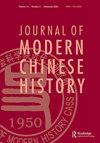When the rule of law met rule by the party: the conflicts between Baptist schools and the local Guomindang in Republican Suzhou
IF 0.1
4区 历史学
Q4 HISTORY
引用次数: 1
Abstract
ABSTRACT This study examines the relationship between the Guomindang (GMD) and the courts by focusing on the 1929 conflicts between the Suzhou Baptist schools and the local GMD party apparatus. The GMD regime supported the principle of rule by the party. At the local level, the GMD’s rise was often stymied by the independent judiciary whose judgments were based on the principle of the rule of law. The local party might not have been able to control the local court in the early years of the GMD regime, but it did steadily alter state-society relationships, as it could benefit from the local court’s commitment to the rule of law. For instance, the district court in Suzhou actively defended the principle of rule by the party in conflicts between Baptist schools and the local party because the GMD had made that principle the law of the land.当法治与党治相遇:民国苏州浸会学校与地方国民党的冲突
国民党政权支持党的执政原则。在地方一级,民盟的崛起经常受到独立司法机构的阻碍,这些司法机构的判决是基于法治原则的。
本文章由计算机程序翻译,如有差异,请以英文原文为准。
求助全文
约1分钟内获得全文
求助全文

 求助内容:
求助内容: 应助结果提醒方式:
应助结果提醒方式:


